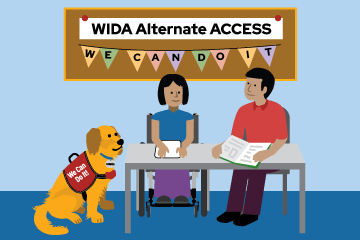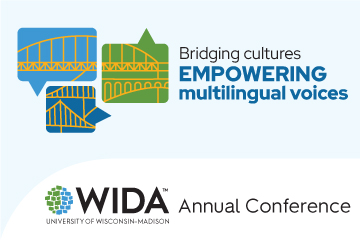Research Publications
Featured Research Publications
All Publications
Annual Technical Report for ACCESS for ELLs Online English Language Proficiency Test Series 503, 2021–2022 Administration
ACCESS for ELLs Online technical reports provide evidence for validity and reliability of ACCESS for ELLs Online and support intended uses, interpretations, and decision made with the test. This is the redacted report for the 2021-2022 administration of ACCESS for ELLs Online without item information.
Resource Details View Download NowAnnual Technical Report for ACCESS for ELLs Paper English Language Proficiency Test Series 503, 2021–2022 Administration
ACCESS for ELLs Paper technical reports provide evidence for validity and reliability of ACCESS for ELLs Paper and support intended uses, interpretations, and decision made with the test. This is the redacted report for the 2021-2022 administration of ACCESS for ELLs Paper without item information.
Resource Details View Download NowAnnual Technical Report for Alternate ACCESS for ELLs English Language Proficiency Test, Series 503, 2021-2022 Administration
Alternate ACCESS for ELLs technical reports provide evidence for validity and reliability of Alternate ACCESS for ELLs and support intended uses, interpretations and decisions made with the test.
This is the redacted report for the 2021-2022 administration of Alternate ACCESS for ELLs. Item information is removed from the report.
Resource Details View Download NowCollaborating with States on Professional Development Planning
This study investigated a coaching process in which state educational representatives (SEAs) and WIDA staff engaged during 2012. The purpose was to enhance the quality of the professional development offered by states to their educators.
Published May 2013
Authors: Daniella Molle, Christie Reveles
Collaborative Learning for English Language Learners
This research brief reports preliminary results from a study of teachers’ successful experiences engaging ELLs in collaborative learning with peers.
Published May 2014
Resource Details View Download NowDetection of Multiple Group Differential Item Functioning for Students with Disabilities of the Alternate ACCESS Field Tests in 2023
This report describe how WIDA applied Differential Item Functioning analysis among multiple disability groups of our Alternate ACCESS Field Test items in 2023.
Resource Details View Download NowDistrict Level Analysis of ELL Growth
This research project explored the patterns of district-level ELL “growth” for the 2007-2011 time period and identified the existence of “high-flying” and “low-cruising” districts within ACCESS for ELLs in terms of ELL growth.
Published May 2013
Author: Narek Sahakyan
Resource Details View Download Now
Evaluating Teacher Effectiveness Using ACCESS for ELLs
Regardless of the growth model, aggregate test-score-based models of student growth require large and longitudinally connected samples of student data. When sample sizes are small it becomes impossible to reliably estimate and disentangle district, school and teacher effects from student growth data.
Published June 2015
Author: Narek Sahakyan
Examining District-Level Growth Using ACCESS for ELLs
This research report provides a description of a study examining school districts in the WIDA Consortium whose English language learners (ELLs) exhibit consistently high growth on the ACCESS for ELLs (ACCESS) assessment.
Published August 2014
Authors: Narek Sahakyan, H. Gary Cook
Examining English Learner Testing, Proficiency and Growth: Before and Throughout the COVID-19 Pandemic
This report examines English learners’ (EL) testing, proficiency and growth in the academic years of 2018–19, 2019–20 and 2020–21, using population-level data from ACCESS for ELLs Online, administered across the WIDA Consortium to students identified as ELs. The objective of the report is to shed light on the impact of the COVID-19 pandemic on ELs’ educational outcomes.
October 2021
Authors: Narek Sahakyan, H. Gary Cook
Examining English Learner Testing, Proficiency, and Growth: Before, During, and “After” the COVID-19 Pandemic
This report examines English learner testing, proficiency, and growth in the years surrounding the COVID-19 pandemic. This research builds on an October 2021 report on the impact of the pandemic, and includes data from the 2021-22 ACCESS for ELLs test administration. Findings indicate that in some grades and language domains EL's average proficiency and growth have returned to pre-pandemic levels. However, for most grades and language domains the evidence points to a continuing impact of COVID-19 on English learners’ English language development.
Published April 2023
Author: Narek Sahakyan, Glenn Poole
Examining English Learner Testing, Proficiency, and Growth: Continued Trends since the COVID-19 Pandemic
This report examines English learners’ testing, proficiency, and growth during the six most recent academic years (2018-2023) to shed light on the continued impact of the COVID-19 pandemic on English learners’ educational outcomes. It provides descriptive evidence on disparities in outcomes within WIDA's English learner population, with substantial average differences in outcomes between English learners identified as Hispanic compared to non-Hispanic ELs. Findings show that these disparities are persistent and have been exacerbated by the COVID-19 pandemic.
Published April 2024
Authors: Glenn Poole, Narek Sahakyan
Examining Growth at the Intersection of IEP and (Long-Term) EL Status
Motivated by findings of a 2018 WIDA report pointing to large overlap between ELs with Individualized Education Program (IEP) designations and those ELs who could be identified as LTELs, this study further focuses on these dual-identified students. Grouping ELs by ever-IEP (i.e., being assigned an IEP at any point in the longitudinal record) and never-IEP status, we compare these two subgroups’ English language growth trajectories across time. Our findings show consistent trends of differential growth and reclassification rates for these two subgroups.
Published November 2021
Authors: Narek Sahakyan, Glenn Poole
Examining How To Establish English Proficiency Using Alternate Composite Scores
The goal of the analyses presented here is to identify a procedure for creating alternate composite scores on English language proficiency assessments without using all four domain test scores (i.e., listening, speaking, reading and writing).
Published April 2013
Author: H. Gary Cook
Examining Relationships Between Alternate Access and State Alternate Assessments
This report examines how Alternate ACCESS for ELLs serves as a tool that identifies English proficiency attainment for English learners with significant cognitive disabilities.
Published December 2014
Author: H. Gary Cook
Examining the Relationship Between the WIDA Screener and ACCESS for ELLs Assessments
This report describes a study that examined to what extent scores on WIDA Screener predict scores on ACCESS for ELLs. Researchers found that Screener scores are strongly predictive of ACCESS scores, even when a variety of individual factors are accounted for.
Published February 2020
Authors: David MacGregor, Narek Sarakyan
Exploring the Long-term English Learner Population Across 15 WIDA States
This research report summarizes findings from a recent WIDA study exploring the potential long-term English learner (LTEL) population across 15 geographically-representative WIDA member states during the period 2009-10 through 2014-15. The findings highlight a continuing need for research that rejects an overly simplistic understanding of the LTEL designation. Additionally, future research should more carefully examine how educational systems, practices, and policies structure the experiences and diverse trajectories of students identified as LTELs.
Published October 2018
Authors: Narek Sarakyan and Sarah Ryan
Generating Imputed Overall Composite Scale Scores for English Learners with Disabilities Who Are Missing Domain Scores in the ACCESS for ELLs Assessment
This technical report aids WIDA Consortium members and stakeholders in producing imputed overall composite scale scores and proficiency levels for students who are missing scores in one or two domains due to a disability.
Published September 2020
Author: Narek Sahakyan
High Quality Professional Development for English Language Learners
This report describes key components of high quality professional development for educators of English language learners.
Published May 2014
Author: Daniella Molle
Impact of ability range restriction on item characteristics in ACCESS multistage adaptive testing
This report describes how different student ability restrictions may affect item characteristics in the ACCESS multistage adaptive testing, and presents options for item administration in field testing.
Resource Details View Download Now



